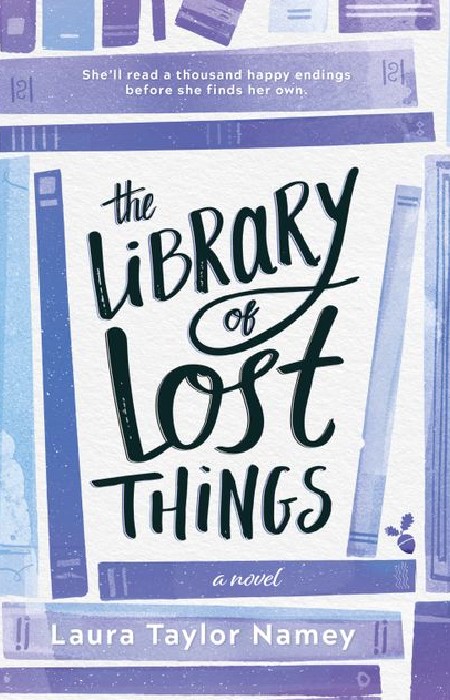
Books are an escape for many people.
Whether you’re a kid trying to pretend the bullies aren’t trying to bash down your existential door or that your family isn’t a chaotic mess of dysfunction, or an adult for whom reality is one searingly painful event too many, books offer a way to step away from life and its many sobering departures from the ideal world we’d all like to live in.
But it is possible to have too much of a good thing, yes, even books, as Darcy Wells, the endearing protagonist of Laura Taylor Namey’s effervescently-grounded debut novel, The Library of Lost Things knows all too well.
Not at the start of this beguilingly honest story however where Darcy is known for one thing and one thing only – assuming anyone save bestie talented fashion designer-to-be Marisol notices her at all – which is the ability to summon whole pages of text or reams of Shakespearean dialogue at a moment’s notice.
It’s not an eidetic memory as such; rather Darcy has spent so much time with books, reading them at every available opportunity, looking at them on the wraparound shelves in her bedroom or selling them at the bookshop where she works, that summoning the words she loves takes no effort at all.
They are, the very core of who she is, an armour against a life which isn’t horrible but which is also far from ideal.
“I’d read enough stories to know how they worked. You had your faraway settings and swoonworthy characters—extra points for tossing in a manic-pixie dream girl or stubbly faced bad boy. Great books give us spine-tingling plots or twists that reach right into your lungs and snatch your breath. I knew about those; I knew about stories. Enough to realize I was sitting in the middle of one and already hated the ending.” (P. 8)
For Darcy, despite all her close friendships with Marisol and her family – a friendship that became devotedly lifelong on the day when Marisol’s mum rescued a potential disastrous cupcake-centric birthday at school for Darcy – has a lot on her seventeen-year-old plate.
Her mother, once an English major who loved reading as much as her daughter until the love of her life and father of Darcy abandoned her for a new life in Thailand, is a hoarder, filling the apartment the two share with an endless stream of online-purchased goods.
She has had some therapy but not enough clearly and so Darcy, who simultaneously loves her mother and is ashamed by her, avoids dealing with the grim reality of her mum’s unending addiction by not allowing anyone, including the new property manager, access to their crowded-with-possessions apartment.
It’s not an ideal situation but it’s not one that Darcy can see a solution to until a series of events, including most importantly one Asher Fleet walking into the bookstore where she works, and thus as is the way of romantic comedies in all their glorious ways, into her closely-guarded heart that things begin to slowly but surely change.
The changes for Darcy, who has well and truly walled herself into what the novel’s blurb rather winningly calls her “carefully constructed ink-and-paper bomb shelter”, are monumentally challenging as Asher’s continued and ever more flirty presence in her life means she may be forced to come out in the open and face life and deal with it as it is in all its non-literary ugliness.

What makes The Library of Lost Things such a compulsively uplifting read is not simply that love, a transformative love at that, is in the offing but that her struggle to step out from behind her books with their enticing words and stories and people and instructive situations, feel so grounded and true.
It is asking a lot of anyone to walk away from the thing or things that have shielded them all their life and to step into the cold light of reality, and Namey seems to understand that deeply and profoundly, investing what might otherwise be a froth-and-bubble story of teenage love (though even if it was that, this is so well-written you’d be perfectly happy with that alone) with a huge amount of emotional gravitas.
You understand why Darcy has done what she’s done, and from a very young age when our reactions are instinctual and all that matters is making ourselves as safe and secure as possible; even as adults, recognising we have done this, and then undoing it, is almost impossible until events conspire to force a rethink and a redo of how you approach life.
Darcy’s life may not be based on the healthiest of responses but it’s all she’s ever known and so it really resonates when she has to confront a lifetime of well-embedded coping mechanisms and re-invent herself if she’s going to let love, in all its forms, right into her life.
You feel for Darcy every step of the way because she’s far from a victim and wants the very best from life but she is, like many of us, entirely unsure about how to go about it, and besides, who doesn’t want a life governed by books and the rich life lessons contained within?
“Beatrice. The audience could only be allowed to see Beatrice. Darcy Jane Wells needed to stay hidden. So, as I spoke my penultimate lines, I reached for the only tool I had— the only tool I’d ever had since that day my mother packed up all her books: words. I veiled myself with language and bricked a story wall around the real me before facing Jase, head-on. Isn’t that what I’d been doing for years, anyway?” (P. 238)
They’re hardly ruining Darcy’s life, and in fact, have saved her over and over but their time has come, but while it’s doubtful Darcy will ever give up books and her ingrained love of reading, it’s time for her to move on with Asher, a onetime flying superstar who has had his hoped-for career permanently derailed by a tragic event on speed-infused night.
The Library of Lost Things is a story, an exquisitely well-told story with characters you have come to love so much that ending the book feels like farewelling the closest of companions, that cuts right through to you, not simply because love, true love is a universal thing we all want, but because we have all been Darcy at one time or another, faced with dismantling our protective structures so a more adult life can flourish or staying put and potentially kissing goodbye to a whole new wonderful life.
Nothing about this novel feels glib or slight; in fact, for all its romantic comedy underpinnings, The Library of Lost Things is gritty and honestly heartfelt that captures how scary it is to move onto new things but how necessary it is if we’re going to have any kind of sustainable, meaningful life.
Sure, hiding is attractive, especially when it’s the escapist imaginary world of books we are hiding in where anything is possible and real life doesn’t feel onerous, scary or difficult, but ultimately, it’s usually not what we need, and as we witness Darcy take her first tentative and then determined steps towards writing her own story and not just living someone’s else’s, we sigh with recognition and joy at what awaits when we dare to be brave,